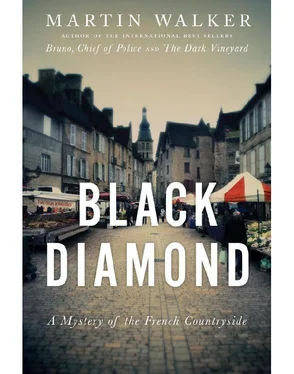Martin Walker - Black Diamond
Здесь есть возможность читать онлайн «Martin Walker - Black Diamond» весь текст электронной книги совершенно бесплатно (целиком полную версию без сокращений). В некоторых случаях можно слушать аудио, скачать через торрент в формате fb2 и присутствует краткое содержание. Жанр: Полицейский детектив, на английском языке. Описание произведения, (предисловие) а так же отзывы посетителей доступны на портале библиотеки ЛибКат.
- Название:Black Diamond
- Автор:
- Жанр:
- Год:неизвестен
- ISBN:нет данных
- Рейтинг книги:3 / 5. Голосов: 1
-
Избранное:Добавить в избранное
- Отзывы:
-
Ваша оценка:
- 60
- 1
- 2
- 3
- 4
- 5
Black Diamond: краткое содержание, описание и аннотация
Предлагаем к чтению аннотацию, описание, краткое содержание или предисловие (зависит от того, что написал сам автор книги «Black Diamond»). Если вы не нашли необходимую информацию о книге — напишите в комментариях, мы постараемся отыскать её.
Black Diamond — читать онлайн бесплатно полную книгу (весь текст) целиком
Ниже представлен текст книги, разбитый по страницам. Система сохранения места последней прочитанной страницы, позволяет с удобством читать онлайн бесплатно книгу «Black Diamond», без необходимости каждый раз заново искать на чём Вы остановились. Поставьте закладку, и сможете в любой момент перейти на страницу, на которой закончили чтение.
Интервал:
Закладка:
Black Diamond
Martin Walker
1
There were not many times that Bruno Courreges disliked his job. But today was certainly one of them. The weather was not to blame, a crisp day in late November with thin, high clouds trailing feebly across a sky that was determined to be blue. And even this early in the morning the sun was warm on his face and lending a rich gold to the few remaining leaves on the line of old oaks that fringed the town’s rugby field. It gave warmth to the aged stone of the mairie across the river and to the red tile roofs of the houses that climbed the hillside. The season was still mild enough, he noticed, for the women to have thrown open their windows and the blue wooden shutters. Splashes of white and blue, stripes and floral patterns, adorned the townscape where they had heaped out bedding to air on the balconies, as their mothers and grandmothers had done before them. It might be the last day of the year that would be possible. A touch of frost had silvered the grass outside his cottage when Bruno walked his dog just after dawn that morning, and he had heard the first of the Christmas Muzak in the supermarket over the weekend.
Bruno turned back to the scene before him, the small crowd waiting outside the silent sawmill, its chimney no longer sending plumes of smoke into the clear sky. The fork-lift trucks that usually scurried like beetles around the warehouses under their loads of timber were all parked neatly in their garage. The air still carried the wholesome scent of fresh-cut wood. But the memory would soon fade, since this was the day that the sawmill, one of the biggest and oldest employers in St. Denis, was to close its doors.
Bruno himself, acting under orders, had two weeks earlier delivered the formal notice of closure from the prefecture, citing the legal judgment against Scierie Pons and its owner for breach of the new rules on pollution in urban areas. As the town’s only policeman, Bruno had tied a copy of the order, wrapped in plastic against the weather, to the sawmill gates. Now he had to stand watch as the law took its solemn course and the court ruling was carried out. And of course he was obliged to deal with whatever ill feeling followed from this long-running feud between the jubilant Green Party and the man they called “the arch-polluter of St. Denis.”
“Pons out, Pons out,” chanted the crowd, led into a chorus by a handsome man with a bullhorn, an expensive leather jacket and a white silk scarf. His long blond hair was tucked into a neat ponytail, and he wore a large Green Party button on his lapel. The posters the crowd carried explained the closure. There had been no economic calamity, no financial embarrassment, no sudden shortage of timber that the woods and forests of the Dordogne region had produced for centuries. There was no shortage of demand for the oak and chestnut, pine and hemlock. Indeed it was known that Boniface Pons, the owner of the sawmill that had been in his family for generations, was simply shifting his entire enterprise to another commune with wide forests and fewer than two hundred voters, where he had been assured there would be none of the angry demonstrations and the endless lawsuits that had driven him from St. Denis.
AT LAST, OUR CHILDREN CAN BREATHE, read one of the posters, which made Bruno roll his eyes at the exaggeration. He had played countless hours of rugby on the nearby playing field and endured dozens of training sessions while the chimney still spouted and never felt out of breath.
ENVIRONMENT 1-PONS 0, read another poster, which for Bruno was closer to the truth. Pons’s sawmill had, over the decade of Bruno’s time as the town’s policeman, installed two separate sets of scrubbing equipment for the steam and smoke that belched from the tall chimney. Each installation was supposed to be the latest in clean-air technology, yet within a few years each had been overtaken by new pollution directives from the European Union in Brussels. The most recent directive, which required any business with a polluting chimney to be a minimum distance from the nearest housing, had been the final straw for Boniface Pons. It was not his fault, Pons maintained, that the commune of St. Denis had decided, years before the latest directive had been thought of, to erect a block of cheap flats for public housing just one hundred and fifty feet from the fence around his sawmill. But with the new regulation, that meant his business was twenty-five feet inside the limit required by the EU.
“I’ve had enough of this green crap,” Pons had announced at the last, heated council meeting. “If you don’t want the jobs I bring and the two hundred thousand euros I pay in taxes to this town’s budget every year, then fine. I’ll go where my jobs are wanted.”
Bruno had hoped to avoid trouble this morning, wishing that Pons would leave his building, lock his gates and make a dignified departure while the crowd of ecolos, the town’s environmental activists, calmly relished their victory. But from the gossip in the cafes and the grumbling around the market stalls, he had known that the closure might not go so smoothly. He had discussed with the mayor, Gerard Mangin, whether they should call on the gendarmes for reinforcements. But the moment they envisaged Capitaine Duroc blundering his way in, they had dropped the idea. Had Duroc been away on a course, and the gendarmes under the experienced command of Sergeant Jules, their presence might have been a sensible precaution. As it was, the mayor and Bruno knew they could count only on themselves and on the years of trust they had built with their neighbors.
The crowd was bigger than Bruno had expected, swollen by curiosity and perhaps also by a sense that an era was passing and that history was finally overtaking the timber industry that had sustained St. Denis for centuries. Through wars and revolution, through boom times and recessions, the trees had always provided wine barrels and the boats that carried them; beams and floorboards and furniture for half the homes of France; desks in the schoolrooms and fires in the grates. Walnut trees provided oil and food and the young green fruit that produced the local vin de noix. Within living memory, in the hard times of Vichy and the German occupation, chestnut trees had even provided flour to make a kind of bread.
So the closure of a sawmill was much more than simply a matter of jobs for the people of St. Denis, Bruno reflected, as he watched knots of pensioners shuffle up the road from the retirement home. The oldest, Rosalie Prarial, the last inhabitant of the town who claimed to remember seeing young men going off to the final battles of the Grande Guerre in 1918, was being helped along by Father Sentout. Like many of the other pensioners, Rosalie had worked at the sawmill all her life, starting under Boniface’s grandfather. Montsouris, the town’s only Communist councillor, must have taken the day off from his job as a train driver, for he and his even more radical wife were approaching, followed by a delegation from the town’s chamber of commerce. Bruno raised his eyebrows; it was a rare event that brought the left and the town’s small businessmen together in common cause.
Half the town appeared to be gathering for the event, and Bruno suspected that most of them would be unhappy at this triumph of the Greens. But he knew his townsfolk to be on the whole levelheaded and law abiding, and while any such assembly brought the prospect of trouble, they were not lined up in opposition but gathered in separate knots and groups. A bit like a funeral, thought Bruno, when people hung back on the outskirts in deference to the family.
The mayor stood under the trees that guarded the rugby field, deliberately keeping his distance from the crowd and the sawmill gates. Beside him stood the baron, the main landowner in the district who was also Bruno’s tennis partner. Albert, the chief of the town’s fire brigade, was out of his customary uniform and smoking a pipe. A pickup truck lumbered around the corner from the public housing block, and Lespinasse, the local garage owner, clambered out with his sister from the florist’s shop and his cousin from the tabac. They all shook hands with the mayor and his party and waved at Bruno.
Читать дальшеИнтервал:
Закладка:
Похожие книги на «Black Diamond»
Представляем Вашему вниманию похожие книги на «Black Diamond» списком для выбора. Мы отобрали схожую по названию и смыслу литературу в надежде предоставить читателям больше вариантов отыскать новые, интересные, ещё непрочитанные произведения.
Обсуждение, отзывы о книге «Black Diamond» и просто собственные мнения читателей. Оставьте ваши комментарии, напишите, что Вы думаете о произведении, его смысле или главных героях. Укажите что конкретно понравилось, а что нет, и почему Вы так считаете.












